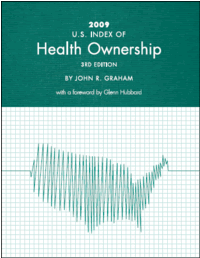North Dakota Comes Out on Top, New York Finishes Last for the Third Straight Year
Americans continue to lack the basic freedom to make their own health care decisions according to this third edition of the U.S. Index of Health Ownership, an annual report by the Pacific Research Institute (PRI). The Index measures the degree to which individuals, be they patients, health professionals, entrepreneurs, or taxpayers, own the health care in their states.

The lack of health ownership is a real problem, said John R. Graham, director of Health Care Studies at PRI and author of the Index. Almost half of the countrys health care spending is in the hands of the government, instead of patients themselves. The other half is governed by regulations inflicted upon doctors, health plans, and patients. On the other hand, some states also limit government interference in their citizens health, resulting in higher quality and choice. The ability for states to learn from each other is one of the benefits of federalism. One of the risks of the current drive for a federal government take-over of our health care is that every American will be burdened by cookie-cutter, one-size-fits-all health care, and we will lose the ability to learn from successful states. I hope that states will use these results to improve their citizens health ownership.
State Ranking Results
The Index uses 24 variables to quantify how state laws and regulations affect the liberty of citizens involved in state government health plans (primarily Medicaid), the private health-insurance market, and the provision of medical services. It also assesses the effect of medical tort on people’s freedom to engage health services.
North Dakota, Montana, Idaho, New Hampshire, and Alabama finished in the top five, as the states that allow their citizens the highest degree of health ownership. North Dakota leads the pack, primarily because of lightly regulated private health insurance and competitive provider markets. It is somewhat less adept at limiting its government health programs and only middling on medical tort.
New York, Massachusetts, North Carolina, Rhode Island, New Jersey rounded out the bottom five, as the states in which the government has taken the most undue control of health care from its citizens. This is the third consecutive year that New York was in last place. The state suffers from government health programs that are out of control, a grossly overregulated private insurance market, and almost completely uncompetitive provider markets. It also lies near the bottom of the medical tort rankings.
A full listing of all 50 states and their rankings is contained in the Index.
The Index will give concerned citizens a good basis to demand from their politicians market-oriented reforms that will result in more health ownership for them and their children, and freedom from government control of their health choices, said Mr. Graham.
U.S. Index of Health Ownership: 3rd Edition
John R. Graham
North Dakota Comes Out on Top, New York Finishes Last for the Third Straight Year
Americans continue to lack the basic freedom to make their own health care decisions according to this third edition of the U.S. Index of Health Ownership, an annual report by the Pacific Research Institute (PRI). The Index measures the degree to which individuals, be they patients, health professionals, entrepreneurs, or taxpayers, own the health care in their states.
The lack of health ownership is a real problem, said John R. Graham, director of Health Care Studies at PRI and author of the Index. Almost half of the countrys health care spending is in the hands of the government, instead of patients themselves. The other half is governed by regulations inflicted upon doctors, health plans, and patients. On the other hand, some states also limit government interference in their citizens health, resulting in higher quality and choice. The ability for states to learn from each other is one of the benefits of federalism. One of the risks of the current drive for a federal government take-over of our health care is that every American will be burdened by cookie-cutter, one-size-fits-all health care, and we will lose the ability to learn from successful states. I hope that states will use these results to improve their citizens health ownership.
State Ranking Results
The Index uses 24 variables to quantify how state laws and regulations affect the liberty of citizens involved in state government health plans (primarily Medicaid), the private health-insurance market, and the provision of medical services. It also assesses the effect of medical tort on people’s freedom to engage health services.
North Dakota, Montana, Idaho, New Hampshire, and Alabama finished in the top five, as the states that allow their citizens the highest degree of health ownership. North Dakota leads the pack, primarily because of lightly regulated private health insurance and competitive provider markets. It is somewhat less adept at limiting its government health programs and only middling on medical tort.
New York, Massachusetts, North Carolina, Rhode Island, New Jersey rounded out the bottom five, as the states in which the government has taken the most undue control of health care from its citizens. This is the third consecutive year that New York was in last place. The state suffers from government health programs that are out of control, a grossly overregulated private insurance market, and almost completely uncompetitive provider markets. It also lies near the bottom of the medical tort rankings.
A full listing of all 50 states and their rankings is contained in the Index.
The Index will give concerned citizens a good basis to demand from their politicians market-oriented reforms that will result in more health ownership for them and their children, and freedom from government control of their health choices, said Mr. Graham.
Nothing contained in this blog is to be construed as necessarily reflecting the views of the Pacific Research Institute or as an attempt to thwart or aid the passage of any legislation.
Subscribe to our newsletter: